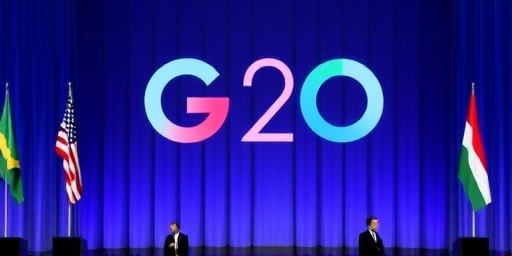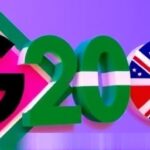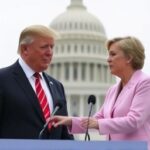Johannesburg’s skyline buzzed with anticipation as the G20 summit officially opened on Monday, but the absence of the United States delegation cast a long shadow over what should have been a triumphant moment for Africa. For the first time in the group’s history, leaders from 19 countries and the European Union gathered on the continent’s soil, yet President Donald Trump’s decision to boycott the event over alleged human rights violations in South Africa has ignited a fresh diplomatic firestorm.
- Johannesburg’s Debut as G20 Host Spotlights Africa’s Rising Voice
- Trump’s Human Rights Allegations Fuel US Boycott of South African Summit
- South African Leaders Defend Sovereignty Amid Diplomatic Backlash
- Global Agendas Press On: Climate and Economy Take Center Stage at G20
- Fractured Alliances Signal Shifts in Post-G20 World Order
The G20 summit in South Africa was meant to spotlight emerging economies and global cooperation, but the US boycott has transformed it into a symbol of fractured diplomacy. With delegates from powerhouses like China, India, and Brazil in attendance, the three-day event at the Sandton Convention Centre proceeds without American input, raising questions about the future of multilateral forums.
Johannesburg’s Debut as G20 Host Spotlights Africa’s Rising Voice
South Africa’s selection as the 2024 G20 host was no accident; it represented a deliberate shift toward inclusivity, giving the Global South a platform to address longstanding inequities. Johannesburg, often called Africa’s economic heartbeat, welcomed over 2,000 delegates, including heads of state and international organization leaders. The summit theme, “Solidarity for a Shared Future,” underscores efforts to tackle climate change, trade imbalances, and pandemic recovery—issues that resonate deeply in a nation still grappling with the legacies of apartheid.
According to South African President Cyril Ramaphosa, who opened the proceedings with a passionate address, this gathering marks a “pivotal moment for the world.” He highlighted Africa’s contributions to global stability, noting that the continent represents 18% of the world’s population and holds vast untapped resources. “We are not just participants; we are architects of tomorrow,” Ramaphosa declared, drawing applause from the assembly.
The venue itself tells a story of transformation. The Sandton Convention Centre, a gleaming modern facility, contrasts sharply with Johannesburg’s townships, where millions live in poverty. Organizers incorporated sustainable elements, such as solar-powered installations and locally sourced catering, to align with G20 commitments on green development. Security was tight, with thousands of police officers patrolling the streets, ensuring the event’s smooth operation despite occasional protests from local activists demanding more focus on domestic issues like unemployment, which hovers at 32%.
Historically, G20 summits have been dominated by Western powers, but this iteration flips the script. Brazil’s recent presidency emphasized social inclusion, and South Africa’s turn builds on that momentum. Experts point out that Africa’s GDP growth outpaced the global average at 4.1% in 2023, per World Bank data, making the continent an indispensable player in discussions on digital economies and supply chain resilience.
Trump’s Human Rights Allegations Fuel US Boycott of South African Summit
The US boycott announcement came like a thunderclap just weeks before the summit. President Trump, in a White House briefing on October 15, lambasted South Africa’s government for what he called “systematic abuses against minorities and political dissidents.” Citing reports from human rights organizations like Amnesty International, Trump referenced ongoing land reform disputes and allegations of corruption within the African National Congress (ANC), South Africa’s ruling party.
“America stands for freedom and justice,” Trump stated firmly. “We will not lend our prestige to a regime that turns a blind eye to these violations. This boycott sends a clear message.” The decision echoes Trump’s foreign policy style—unilateral and confrontational—seen in his withdrawals from the Paris Climate Accord and the Iran nuclear deal. U.S. Treasury Secretary Janet Yellen and National Security Advisor Jake Sullivan were slated to attend but have been recalled, leaving a void in economic policy talks.
Diplomatic cables leaked to the media reveal that tensions simmered for months. U.S. officials had urged Pretoria to expedite investigations into high-profile cases, including the 2021 riots that claimed over 350 lives amid economic unrest. South Africa’s foreign ministry dismissed the claims as “politically motivated,” arguing they ignore the country’s progress in reconciliation post-apartheid. A 2023 U.S. State Department report graded South Africa’s human rights record as “partially free,” but critics say the boycott exaggerates flaws to advance American interests in mineral resources like platinum and cobalt, crucial for electric vehicles.
The ripple effects are immediate. Bilateral trade between the U.S. and South Africa, valued at $20 billion annually, could suffer if the rift deepens. Analysts from the Council on Foreign Relations warn that excluding the U.S.—the world’s largest economy—from G20 deliberations might stall progress on global financial reforms, such as increasing IMF voting shares for developing nations.
South African Leaders Defend Sovereignty Amid Diplomatic Backlash
In Pretoria, the backlash against the US boycott has unified South African officials and civil society. Foreign Minister Naledi Pandor addressed the nation via a televised statement, emphasizing that “no single country dictates the terms of international diplomacy. South Africa remains committed to the G20’s principles of equality and mutual respect.” Pandor pointed to the country’s Constitutional Court rulings upholding human rights and invited U.S. civil society observers to witness reforms firsthand.
Opposition voices within South Africa add nuance. Democratic Alliance leader John Steenhuisen acknowledged governance challenges but criticized the boycott as “hypocritical,” noting U.S. alliances with nations facing similar issues. “This is less about rights and more about leverage in trade negotiations,” Steenhuisen told Reuters.
International allies rallied around the host. China’s President Xi Jinping, arriving early, praised South Africa’s “leadership in the multipolar world,” while India’s Prime Minister Narendra Modi highlighted shared democratic values. The European Union, represented by Ursula von der Leyen, expressed regret over the U.S. absence but affirmed commitment to inclusive dialogue. A joint statement from BRICS nations (Brazil, Russia, India, China, South Africa) called the boycott “regrettable” and urged a return to constructive engagement.
Public sentiment in Johannesburg is mixed. Street interviews by local media captured frustration: a taxi driver lamented potential job losses from strained ties, while a university student hailed the summit’s defiance as empowering. Protests outside the U.S. embassy drew hundreds, waving placards reading “Boycott the Boycotters.” Economists estimate the event could inject $500 million into the local economy through tourism and infrastructure, underscoring its tangible benefits despite the diplomatic drama.
Global Agendas Press On: Climate and Economy Take Center Stage at G20
Undeterred by the U.S. no-show, the G20 summit agenda barrels forward with high-stakes discussions. Day one focused on climate finance, where developing nations demand $100 billion annually from richer countries—a pledge first made in 2009 but chronically underdelivered. South Africa’s delegation pushed for debt relief mechanisms, arguing that climate vulnerabilities exacerbate fiscal burdens in Africa, where droughts and floods have displaced millions.
A key session on digital trade saw commitments to bridge the “digital divide.” With only 40% internet penetration in sub-Saharan Africa versus 90% in Europe, initiatives like the African Continental Free Trade Area (AfCFTA) were spotlighted. Indian tech firms pledged investments in South African startups, fostering innovation in fintech and e-commerce.
Health security loomed large, post-COVID. The summit aims to reform the World Health Organization for equitable vaccine distribution, with South Africa advocating for patent waivers on mRNA technology. Statistics from the WHO reveal that Africa received just 5% of global COVID vaccines initially, fueling calls for systemic change.
Geopolitical undercurrents, including the Russia-Ukraine conflict and Middle East tensions, threaded through talks. Without U.S. mediation, European leaders leaned on G20 consensus-building to de-escalate food price spikes affecting African imports. A working group on gender equality highlighted women’s roles in peacebuilding, drawing from South Africa’s own history of female-led activism.
Side events enriched the program: a youth forum engaged 500 young Africans in policy brainstorming, while business roundtables connected multinationals with local entrepreneurs. Outcomes so far include a draft communique on sustainable mining, addressing ethical sourcing of critical minerals amid U.S.-China rivalry.
Fractured Alliances Signal Shifts in Post-G20 World Order
As the G20 summit in South Africa unfolds, the US boycott portends deeper realignments in global diplomacy. Observers predict that a successful event without American participation could embolden the Global South to pursue independent paths, perhaps strengthening ties within the BRICS bloc or the African Union.
Looking ahead, the rift might complicate U.S. efforts to counter Chinese influence in Africa, where Beijing has invested over $300 billion via the Belt and Road Initiative. South Africa, as a non-permanent UN Security Council member, could leverage the summit to amplify calls for UN reforms, diluting veto powers held by permanent members like the U.S.
Reconciliation steps are tentative. Backchannel talks between envoys suggest a possible U.S. return to future engagements if human rights benchmarks are met. Ramaphosa has extended an olive branch, inviting Trump to a bilateral meeting. Yet, with midterm elections looming in the U.S., domestic politics may prolong the standoff.
For South Africa, the summit cements its stature as a diplomatic hub, potentially attracting more foreign direct investment. Globally, it underscores the G20’s evolving role: from crisis responder to architect of equitable growth. As delegates depart Johannesburg, the world watches whether this absence heals divides or widens them, shaping alliances for years to come.








